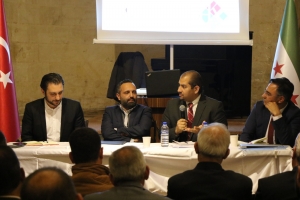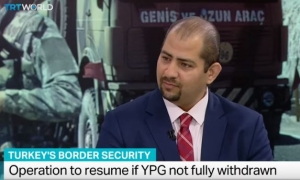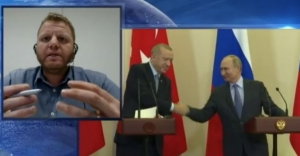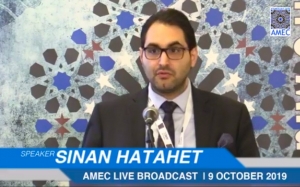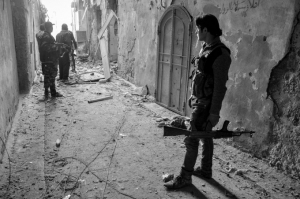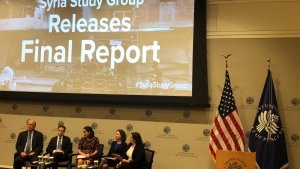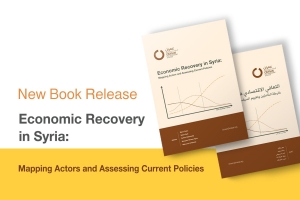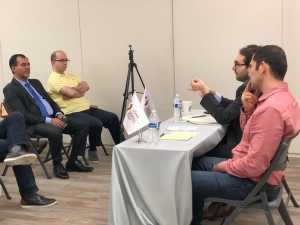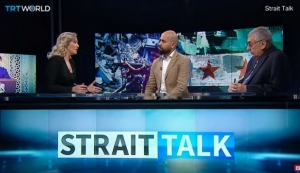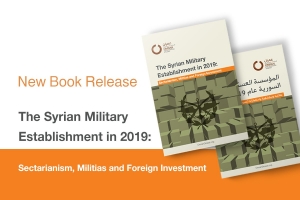Workshop | The Security structures in the liberated areas
On November 28, 2019, in Gaziantep, the Stabilization Committee in partnership with KALmec (Kalyoncu Middle East Research Center) has held a workshop entitled ‘’the Security structure in the liberated areas’’.
In the second section the Executive Director of Omran for Strategic Studies Dr. Ammar Kahf, talked about the security structure in the region. He asserted that the figures given in the presentation prepared by the Stabilization Committee are correct; he said we are sure because we have been working for two years now to collect information on bombings and terrorist attacks taking place in the region. He also said we should work to regulate relationship and strengthen coordination between the military, police and civilians through focused sessions on reference, governance, transparency, organization and administrative control.
The Workshop attended by the Syrian Interim Government’s Minister of Justice and the representative of Syrian Interim Government’s Interior Ministry, alongside Heads of Local Councils, representatives of civil & military police forces, representatives of Military factions, lawyers, Judges and CSO representatives in the northern countryside of Aleppo. As they are directly concerned with the security issues in the liberated areas in North of Syria.
Dr. Ammar Kahf | Turkey's Border Security
Dr. Ammar Kahf, Executive Director of the Omran Center for Strategic Studies, gave his perspective on Turkish border security and The Syrian Constitutional Committee during at his last interview at TRT WORLD.
Navvar Saban | About The Russian-Turkish agreement in northeastern of Syria
Information Unit Manager at Omran Center for Strategic Studies talked to ABC News about the Russian-Turkish agreement in northeastern part of Syria (East of the Euphrates).
Navvar Şaban said: Zooming In to the agreement we will find that some points of it remain unclear, stressing that the task is not only to announce the agreement, but there are some points that should be taken care of before it becomes a major problem in the region.
Conference: Playground for foreign powers: MENA region as a target to foreign intervention
In Pretoria 8-9 October 2019. Omran Center Senior Fellow Dr. Sinan Hatahet participated at the annual international conference organized by Afro-Middle East Centre entitled "Playground for foreign powers: MENA region as a target to foreign intervention".
Developments in regard of the Syria
Omran Center for Strategic Studies board member Mr. Yasser Tabbara, and Omran’s information unit manager Navvar Saban attended a round table hosted by Middle East Institute (MEI) in their main office in Washington DC on the 24th of September 2019.They talked in details about the most important issues and developments in regard of the Syrian file, which included the following:
1- Iranian threat in Syria.
2- The North developments in Syria.
3- Reintegrate militias in the structure of the Regime army.
4- Current fragile security situation in the regime areas.
In the second part of the round table, both of Mr.Tabbara and Saban answered the audience questions about different topics related to the ground situations in Syria and how it might affect the ongoing political efforts.
Discussion Session: about the final report for the Syria Study Group (SSG).
In Washington, 26 Sep 2019. Omran Center Senior Fellow Yaser Tabbara and Information Unit Manager Navvar Saban attended the release of the final report for the Syria Study Group (SSG).
This session organized by United States Institute of Peace (USIP) to present and discuss the assessments and recommendations of the final report, which took several months to work through extensive consultations across a wide range of local experts, regional and international stakeholders.
Economic Recovery in Syria: Mapping Actors and Assessing Current Policies
Introduction
The conflict in Syria that has been dragging on since 2011 generated many challenges that began to take shape as the conflict is coming to an end. Some of the key challenges pertain to early economic recovery which has already started in the various areas of the country, with their different influences, needs, resources and potentials. Given the current situation in Syria—with the consolidation of zones of influence and the faltering political process -local, regional, and international policies have begun to adapt to this reality, with key stakeholders launching early economic recovery projects in the established zones of influence.
The political and military landscape in Syria remains precarious and questions of the capacity of different actors, reality of these regions and the political context pertaining to economic recovery in these areas must be addressed in order for stakeholders to successfully implement early recovery projects. Accordingly, the Omran Center for Strategic Studies has developed a research series to understand the dynamics, political compass, requirements, and challenges of these early recovery projects so for them to facilitate the establishment of stability on the ground.
Early recovery is critical because it is the phase that is supposed to transition the country from conflict to peace and stability and lay the foundation for the subsequent reconstruction process. This phase has political and social dimensions that are of equal importance to its economic dimension. The political dimension involves working to stop violence throughout the country, establishing new governance institutions, and reaching a political solut3. Autonomous Administrationion that generates stability. The social dimension includes relief work, accommodations and housing for refugees, and national reconciliation after the preparation of an appropriate security environment. The economic dimension includes the restoration of basic public utilities, relaunching of the economy moving, rebalancing the macroeconomic framework, and dismantling the components of the conflict economy in areas both outside of and under state control. The above political, social, and economic elements are significantly intertwined and success in any one area depends on success in the other two.
The research orientation of Omran Center assumes that the coming phase in Syria will take place in a military post-conflict setting and that a most likely scenario to play out will be one of two: The first scenario is the instilment of the zones of influence: a ‘useful Syria’ with Iranian and Russian influence, eastern Syria with Western-Arab influence, and northern Syria with Turkish influence. The second scenario is continued investment in the ceasefire by regional and international actors, with priority placed on declared or undeclared negotiations to reach a new form of authority in which the existing regime maintains the largest share, thanks both to the efforts of its allies and the regime’s success in retaining the mechanisms of control.
The overall objectives of the research orientation of Omran Center are to identify criteria for an effective early economic recovery that is conducive to stability and development and to create a policy framework for implementing those recovery efforts. This research also aims to define the requirements and conditions for early recovery as they relate to security, governance, and development and to reach a position regarding the regime’s ability to handle Syria’s post-conflict challenges and to implement recovery and reconstruction policies. In this context, Omran has produced five reports:
1. A political analysis paper on the political context of early recovery in Syria;
2. An analytical paper of early economic recovery in Syria: challenges and priorities;
3. A paper on the political economy of early recovery in Syria;
4. A study on Early Recovery in Syria: An Assessment of the Regime’s Role and Capability; and 5. A study on the Turkish approach to early economic recovery in Syria, Euphrates Shield area as a case study.
For More Click Here: http://bit.ly/2lHvGit
Note of Appreciation
Omran for Strategic Studies expresses its gratitude for support received from Konrad-Adenauer-Stiftung.
The Future of the Conflict in Syria
In coordination with Omran Center For Strategic Studies, Syrian American Council, and Syrian Forum USA a discussion session was coordinated on 14 Sep 2019, in Washington DC in America entitled "The Future of the Conflict in Syria" and what will be the field and political developments? Senior fellow Dr. Sinan Hatahet at omran center participated and considered that the challenge in 2020 to the Syrian revolution is to try to stop the bleeding and redefine the negotiating path with the regime by finding new understanding and spaces with the United States and the European Union. This leads to the formation of a new opposition bloc that relies on its own sources
Mr. Yaser Tabbara | Discussing the updated situation in Syria
As the Syrian regime intensifies its bombing campaign in the country’s last rebel stronghold of Idlib, the UN sounds the alarm of a humanitarian catastrophe.
Mr. Yaser Tabbara a board member of the Omran Center for Strategic Studies participated on 7 June 2019, in TRT world in "Strait Talk" discussing the updated situation in Syria, mainly discussing Idlib and the Russian escalation in the region despite the Turkish/Russian DMZ agreement, also Yasser talked about post "ISIS" phase and the security situation in SDF-held areas.
The Syrian Military Establishment in 2019: Sectarianism, Militias and Foreign Investment
Introduction
Questions about the fate of Syria’s security and defense sectors continue to be some of the most important questions facing the country today. These questions have only grown in importance since the revolution, both because reforming these sectors was one of the main demands of protestors, and because Syria’s security and defense institutions have undergone profound transformations in their structure and function. Most of these questions remain unanswered, as security agencies consider research in this field as acts “against security and defense.” At the same time, the shortcomings in Syria’s security and defense sectors that must be addressed are both numerous and old, and recent policies and practices have served to exacerbate these issues, transforming them into increasingly intractable dilemmas.
The current reality of the Syrian military establishment raises questions about the very nature of its existence and fate, especially given the changes in its social composition, power centers, and key actors. Given these substantial shifts, there is an urgent need for research to redefine Syria’s military establishment and to understand how the changes in its structure will impact the restructuring process that is already underway. So far, this process is being driven by several conflicting agendas, but is entirely lacking any consideration of the crucial national dimension.
The role of the army and its impact on local interactions and shifts and on the dynamics of democratic transformation remain central questions facing the process of restructuring the Syrian military establishment. The structural and functional shortcoming and the identity distortions that have taken occurred in the military establishment have led it to constantly intervene in Syrian society and politics in a manner that both serves and fuels the philosophy of the ruling class. As a result of the ideological, organizational, and functional distortion of the security and defense establishments, these institutions have become completely alienated from Syrian society. They lack any sense of neutrality and are instead forces that are politically aligned with the regime.
The main challenges to restructuring Syria’s military establishment include the implementation of the technical aspects of complex demobilization, disarmament, and reintegration (DDR) and security sector reform (SSR) programs, but also the specific features of the Syrian context, such as the partisan nature of the army and its doctrine, and the complete absence of a legal framework for civil-military relations.
In 2018, the Omran Center for Strategic Studies launched a research project on the transformations taking place in the Syrian military establishment and the challenges of change and reform. Omran has continued this course of research into 2019 and is pleased to present its second volume of research in this area: “The Syrian Military Establishment in 2019: Sectarianism, Militias and Foreign Investment.” This collection of papers focuses on the current reality of Syria’s military establishment in 2019 and grapples with questions related to its organizational structure and the new networks forming within that structure. The subjects that are covered in the papers in this volume are as follows:
- Sectarianism in the Syrian Army: A study of the social composition of the military:
- Military Groups and Networks within the Syrian Army: Multiple Loyalties and Militia Mentality (paper).
- The Role and Fate of Palestinian Forces and Militias Loyal to the Syrian Regime (paper).
- New Military Corps in the Syrian Army (report).
- Testing the Regime’s Capacity for Restructuring and Reintegration (paper).
- Non-Technical Challenges of Restructuring Syria’s Military (paper).
- Military Judicial System in Syria from 1950-2019 (report).
The research findings have been based on five focus group discussions organized by the Omran Center with defected officers of various specializations in a number of cities in southern Turkey to discuss two main themes: 1) What remains of the Syrian army? and, 2) Inducing sectarianism and its mechanisms in the army. In addition to these focus groups, Omran researchers conducted dozens of one-on-one interviews with defected officers.
For More Click here:
Arabic version: http://bit.ly/2LvSWum
English: version: http://bit.ly/2XiPeGZ

